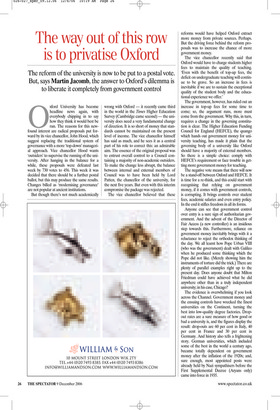The way out of this row is to privatise Oxford
The reform of the university is now to be put to a postal vote. But, says Martin Jacomb, the answer to Oxford’s dilemma is to liberate it completely from government control Oxford University has become headline news again, with everybody chipping in to say how they think it would best be run. The reasons for this newfound interest are radical proposals put forward by its vice chancellor, John Hood, which suggest replacing the traditional system of governance with a more ‘top-down’ managerial approach. Vice chancellor Hood wants ‘outsiders’ to supervise the running of the university. After hanging in the balance for a while, these proposals were defeated last week by 730 votes to 456. This week it was decided that there should be a further postal ballot, but this may produce the same results. Changes billed as ‘modernising governance’ are not popular at ancient institutions.
But though there’s not much academically wrong with Oxford — it recently came third in the world in the Times Higher Education Survey (Cambridge came second) — the university does need a very fundamental change of direction. It is so short of money that standards cannot be maintained on the present level of income. The vice chancellor himself has said as much, and he sees it as a central part of his role to correct this: an admirable aim. The essence of the original proposal was to entrust overall control to a Council containing a majority of non-academic outsiders. To make the change less abrupt, the balance between internal and external members of Council was to have been held by Lord Patten, the chancellor of the university, for the next five years. But even with this interim compromise the package was rejected.
The vice chancellor believed that these reforms would have helped Oxford extract more money from private sources. Perhaps. But the driving force behind the reform proposals was to increase the chance of more government money.
The vice chancellor recently said that Oxford would have to charge students higher fees to maintain the quality of teaching. ‘Even with the benefit of top-up fees, the deficit on undergraduate teaching will continue to be grave. So an increase in fees is inevitable if we are to sustain the exceptional quality of the student body and the educational experience we offer.’ The government, however, has ruled out an increase in top-up fees for some time to come; so, the argument runs, more must come from the government. Why this, in turn, requires a change in the governing constitution is clear. The Higher Education Funding Council for England (HEFCE), the quango which hands out government money for university teaching, has made it plain that the governing body of a university like Oxford should have a majority of external members. So there is a simple choice: comply with HEFCE’s requirement or face trouble in getting more government money for teaching.
The negative vote means that there will now be a stand-off between Oxford and HEFCE. It is time for a re-think, and this could start with recognising that relying on government money, if it comes with government controls, is corrupting. It brings controls over student fees, academic salaries and even entry policy. In the end it stifles freedom in all its forms.
Anyone can see that government control over entry is a sure sign of authoritarian government. And the advent of the Director of Fair Access (a new controller) is an insidious step towards this. Furthermore, reliance on government money inevitably brings with it a reluctance to reject the orthodox thinking of the day. We all learnt how Pope Urban VIII (who was the government) dealt with Galileo when he produced some thinking which the Pope did not like. (Merely showing him the instruments of torture did the trick.) There are plenty of parallel examples right up to the present day. Does anyone doubt that Milton Friedman could have achieved what he did anywhere other than in a truly independent university; in his case, Chicago?
The evidence is overwhelming if you look across the Channel. Government money and the ensuing controls have wrecked the finest universities on the Continent, turning the best into low-quality degree factories. Dropout rates are a sure measure of how good or bad a university is, and the figures display the result: drop-outs are 60 per cent in Italy, 40 per cent in France and 30 per cent in Germany. And history also tells a frightening story. German universities, which included some of the best in the world a century ago, became totally dependent on government money after the inflation of the 1920s; and, sure enough, most appointed posts were already held by Nazi sympathisers before the First Supplemental Decree (Aryans only) came into force in 1935. It was this truth that led Max Beloff to found Buckingham University 30 years ago. A government which was really determined to preserve and enhance the quality of leading British universities could easily give them back their independence, and the money to make it work, with a ‘needs blind’ policy for poor students built in. It would save the £250 million per year that universities have to spend answering the dozen agencies which control higher education; but this is a minor advantage compared with the prize of freedom.
Do not be fooled by those who say it is impossible. That was said about the privatisation of our lumbering, loss-making nationalised industries. It would require strength to overcome the power of a massive entrenched bureaucracy; and to face voters with the need to pay more for their children’s university education. So such a decision will not be coming from this government, which believes in controlling all aspects of our lives. But a future government could carry it out, at any rate for the top five universities, very easily.
The research grants could be taken from FIEFCE’s remit, and the research dual funding (which comes without government interference) would go direct to the research bodies. Oxford and the others could then opt to leave FIEFCE, a step which would free them from control of student fees and academic salaries. The teaching income would be replaced by substantially higher fees from students.
Oxford would then be on its way to solving its income problem and regaining its independence. And independence would surely make giving private money more appealing; and that would enable a ‘needs blind’ policy for 20 per cent of admissions of poor students to be built in.
A more radical approach would free all universities. This would take all the government money now being spent on universities and use it under an irrevocable arrangement to provide a guaranteed index-linked income, based on present allocations, for every university. The recipient universities would thereafter be free of controls (the money being an outright grant) and hence able to charge what fees they liked, subject to admitting 20 per cent of students on a ‘needs blind’ basis. They could pay whatever academic salaries they decided. Most parents would have to pay more; but someone has got to anyway. Government spending would actually be less, since the costs of bureaucracy would be saved. And universities would thereafter either sink or swim. The ones worth saving would swim.
Three weeks ago, led by Simon Jenkins, I spoke at the Oxford Union in favour of the motion that Oxford should ‘go private’, by which was meant ‘should do whatever is necessary to regain its independence’. But we lost the debate. Clearly most people still believe in the temporary comfort of government spending. But it’s worth persisting, if you believe in liberty.
Sir Martin Jacomb was, among other senior City posts, a director of the Bank of England; he is currently chairman of Canary Wharf Group.



























































































 Previous page
Previous page